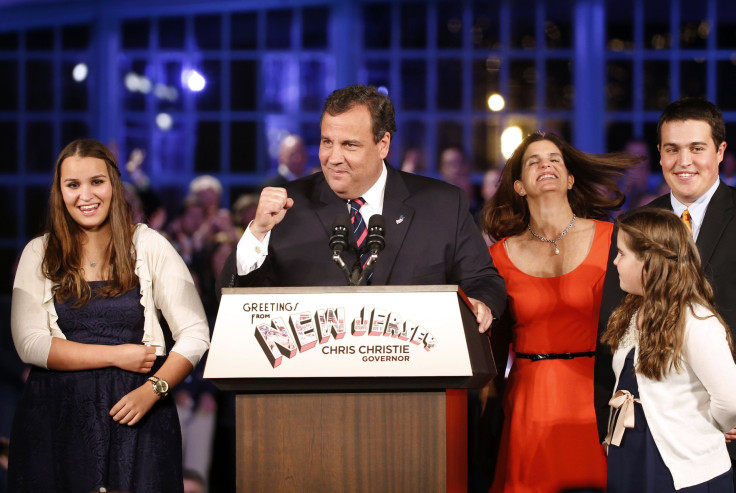Chris Christie's Front-Runner Status Is An Asset, Not A Hindrance, To 2016 Nomination

Is history working against New Jersey Gov. Chris Christie’s chances at securing a Republican Party presidential nomination in 2016? According to former N.J. Gov. Tom Kean, Christie has little chance at actually making it across the finish line, because front-runner candidates this early in the race typically burn out before the game is over. Is what Kean is saying true, though?
“If you think how often the front-runner at this point has gotten the nomination, it’s very seldom,” Kean told Politico.
In reality, however, the truth is a little more complicated. Obviously, the 2016 presidential race is still in its infancy, and everything is likely to change, but more often than not throughout recent Republican history, early front-runners do, in fact, end up with the party's nomination. For starters, let’s take a look at the most celebrated Republican of the 20th century: Ronald Reagan.
As the 1980 Republican primaries approached, it was almost a foregone conclusion that Reagan would eventually take the candidacy (and later, the presidency). Just four years earlier, Reagan came within a stone's throw of taking the nomination from incumbent President Gerald Ford, a feat no one has managed or even seriously attempted since.
Reagan was so popular at the time that he even famously declined to attend a number of straw polls and forums throughout 1979. In the end, he won 29 of 36 primaries and handily secured the Republican Party nomination with 59.8 percent of the vote and 44 states. His eventual vice president, George H.W. Bush, mustered up less than half of that amount with only 23 percent in the same primary.
As venerated as Reagan is on the right, his case isn’t unusual among Republican races. George W. Bush, for instance, enjoyed tremendous popularity as governor of Texas, and after he won re-election in 1998 with a record 69 percent of the vote, media agencies widely speculated that he may run for president in the following years. As the son of a former president and with connections to powerful fund-raising operations, Bush immediately established himself as the front-runner in the Republican race after declaring his candidacy in 1999.
In early 2000, Sen. John McCain posed a threat to Bush, but by March of that year, McCain had lost his final primary and Bush went on to dominate the remaining races at overwhelming odds (Bush won roughly double the votes McCain received). Once again, Bush went from a powerful front-runner candidate to President of the United States.
McCain himself went on to experience a weaker version of the same phenomenon. After making a name for himself challenging Bush, it was almost a given that McCain would run again in 2008. When he did announce his candidacy, McCain faced a fierce battle against Mitt Romney, Rudy Guliani and Mike Huckabee, but he eventually won. The 2008 primaries were a much more open race than those in 1980 and 2000, but the fact remains that McCain established himself early on as a big name in the race and went on to secure the Republican nomination, if not the presidency itself.
Still, that doesn’t mean that becoming a big name in the early campaign always translates toward winning the vote. In the 2012 election, for instance, Newt Gingrich quickly emerged as one of the most powerful candidates in the Republican primaries, and by December 2011, Pew reported that he was polling well ahead of eventual Republican candidate Mitt Romney. In the end, Gingrich, of course, lost the nomination. But throughout the race, support for both candidates was tepid at best, and neither commanded the loyalty inspired by Reagan, Bush and McCain.
In the past, there have also been notable Republican front-runners who wavered throughout the race until their support dried up altogether. Guliani, for instance, was considered a big name early on 2008, but withdrew before almost every other candidate after bombing in the Florida primary. Still, that doesn't change the fact that all Republican candidates in the past few decades established themselves as strong contenders before the races even began. Those that failed to do so ended up like 2012's most famous also-ran, Herman Cain.
Right now, it remains to be seen if Christie can inspire that kind of loyalty for himself. As the Republican governor of a blue state, for example, Christie has a lot of work to do getting Southern voters on his side. If he can manage that, and establish a stronger presence before announcing his candidacy, history will be on his side.
© Copyright IBTimes 2024. All rights reserved.






















